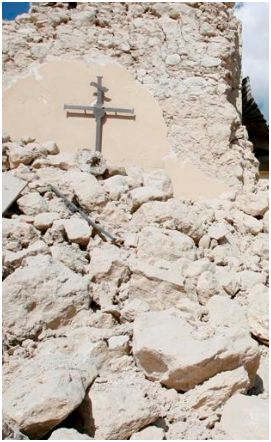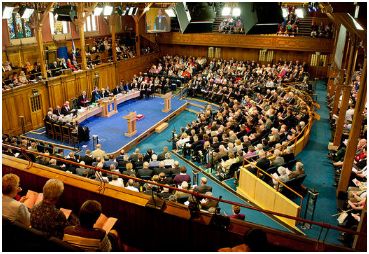Multitudes, multitudes in the Valley of Decision
Following the decision by the Church of Scotland in its General Assembly of 2011 to allow actively-homosexual clergy in its churches, it is 'make your mind up' time for all within the national church.
 "If the foundations are destroyed, what can the righteous do?" "If the foundations are destroyed, what can the righteous do?" (Psalm 11:3)
"I have not made trouble for Israel," Elijah replied. "But you and your father's family have. You have abandoned the Lord's commands and have followed the Baals. Now summon the people from all over Israel to meet me on Mount Carmel. And bring the four hundred and fifty prophets of Baal and the four hundred prophets of Asherah, who eat at Jezebel's table." So Ahab sent word throughout all Israel and assembled the prophets on Mount Carmel. Elijah went before the people and said, "How long will you waver between two opinions? If the LORD is God, follow him; but if Baal is God, follow him." (1 Kings 18:18-21) "Choose for yourselves this day whom you will serve ...but as for me and my household, we will serve the LORD." (Joshua 24:15)
Church of Scotland in General Assembly: May 2011
 ON SUNDAY mornings congregations up and down the land sit in their Church of Scotland pews and wait to hear a message from the pulpit: this Sunday will be no different. ON SUNDAY mornings congregations up and down the land sit in their Church of Scotland pews and wait to hear a message from the pulpit: this Sunday will be no different.
But there will be a rapt attention to hear what the preacher has to say on the events of last Monday. It was then, meeting in General Assembly, the Church of Scotland voted – with certain restrictions – to allow the induction of actively-homosexual clergy into the denomination’s parish churches.
The report to the Assembly compiled by a Special Commission examined the subject of ‘Same Sex Relationships and the Ministry.’ The impetus behind the commissioning of the report was the induction in 2009 of an actively-homosexual minister into a church in Aberdeen. Whilst the report presented this last week indicated that the majority view across the denomination was to uphold the traditional (monogamous/heterosexual) view of marriage, to have accepted this fact at Assembly level would have placed the Church in the position of having to deal with the prevailing situation in Queen’s Cross church, Aberdeen. And this would have caused huge upset and division. However to remove the 2009 moratorium on any further inductions and training of homosexuals would also have created a furore. (At this point it needs to be said that keeping the denomination together – in any form – is the over-riding imperative which drives Assembly debates. ‘Unity’ – sadly even amongst evangelicals – most often trumps Truth and God’s Word.)
Fudge and compromise
Accordingly, to remove itself from the horns of a dilemma, the General Assembly did what General Assemblies are highly skilled in doing, and manoeuvred the procedure and the debate in order to produce a compromise (aka ‘fudge’). In a great encouragement to the liberal camp the decision was to leave the Aberdeen minister in post, and to allow any other homosexual ministers who were inducted prior to 2009 to carry on with life as normal provided they were open about their sexual proclivities and lifestyle. (The Kirk is after all a ‘confessing’ church.)
| As a sop and an (ultimately-failed) attempt to appease the evangelical wing, the 2009 ban on induction and training of homosexuals is to stay in place until a theological study on the whole issue reports to the 2013 General Assembly in two years time. |
"What they have done is very crafty.."
Harry Reid |
Harry Reid, a former editor of the Herald and author of a comprehensive study of the Church of Scotland commented: "In some ways what they have done is very crafty. "They are going to be able to move cautiously over the next two years towards a complete acceptance of gay clergy, and by 2013 the landscape may be very different". Indeed it might.
While the ban on church officials commenting publicly has been extended for the next two years, one lady in conversation asked: “Do they think that God doesn’t see what they are doing?" (cf Ezek 8:12).
Those pushing the homosexual agenda (and there are many – not least in the Kirk’s HQ in 121 George Street, Edinburgh) are delighted with the recent decision. After all, this is a war of attrition and – as those who control it are well aware – the system can grind its opponents down. As one leading evangelical commented following the 2009 Assembly and speaking of ‘121’: “There is an agenda running.” There is indeed.
So what will parishioners hear this Sunday? Well that depends.
If the person in the pulpit is someone who would seem either not to know God’s word or refuse to live and preach it, then the congregation will probably hear words of sorrow about the possibility of division, but enthusiastic reassurances that the church to which they belong is now finally coming into line with our post-modern, politically-correct, tolerant, loving and inclusive society. There will be variations no doubt, but the underlying message will be much the same – the Church needs to move with the times.
However if the Sunday worshiper is in an evangelical Bible-believing church then unfortunately there will probably be almost as many slants on current events as there are evangelical ministers in pulpits.
Varied responses: confusing picture
There is a huge variety of personal situations across the spectrum of evangelical ministers. Some will be in training; others newly-ordained; some having just moved to a new congregation; others about to retire. Some ministers might have their immediate family, eldership and congregation behind them; others might find themselves in any number of permutations regarding support or lack of it. Some ministers might be financially independent of their Church of Scotland stipend (a de facto salary); for others it will be their main source of income.
Rev. Iain Watson who is part of the evangelical Forward Together grouping has been quoted as saying: ""There will be no knee-jerk reaction, but we anticipate long, hard discussions about our future. Our relationship with the denomination has irrevocably been changed by the decision. How this will manifest itself is too early to say."
Now at the end of the day one would hope that men of faith in leadership positions within the body of Christ will do what is faithful to God rather than what human wisdom would normally dictate. Faith, after all, is not faith until it is all that you are holding on to. But there is already evidence – apparent before, during and since the Assembly – of these aforementioned situational influences conditioning the personal and individual responses of those in the Kirk’s paid employ.
Whatever the day-to-day challenges of the job, Church of Scotland ministers are – in an uncertain age – in one of the most secure forms of employment around. (When asking recently what a minister would have to do in order to be sacked, the reply (from a minister) came back: “Be baptised as an adult after being christened as a child.”)
Institutional dependency
The reason for making these points is to illustrate that the institution which is the national church is, in terms of security of tenure and conditions of employment, a very cosy place to be. And it takes real courage and no little faith to step out into the unknown. But if, as is often preached, the cattle on a thousand hills belong to the Lord (Ps. 50:10), then the Almighty will have little difficulty in covering a preacher’s household bills. However the promise of God’s provision is not based on ‘seek first the unity and peace of the Church of Scotland’ (cf Matt 6:33). (If the apostle Paul was still on earth he might now be seeing an opportunity for holding classes in tent-making. Whether there would be an uptake is a different question.)
Some leaders might of course suggest that evangelicals – including themselves – should stay, and seek to bring influence and change from within.
(That was one of the arguments after the 2009 Assembly; but the trend in the intervening two years and – much more importantly – Haggai 2:11-14 undermines this notion.) |
"Leadership ... is too important to be left to leaders".
(Leadership: Limits and Possibilities: K. Grint.) |
With all this in mind it will be a disappointment but of no surprise if the ‘bottom line’ from many ‘evangelical’ pulpits is refracted through the lens of each preacher’s individual and personal circumstance.
While this is a dynamic which can impact on us all, not everyone preaches to an assembled audience from a platform. In fact it is absolutely vital that each and every believer looks ultimately to the Holy Spirit for leadership. At a personal level He is our promised guide and should be the final arbiter of a Church of Scotland believer’s response to the cataclysmic crisis within the national church.
Historical, but no repeat of history
At this point in time – although things might change – this is not a ‘one scenario/concerted action’ replay of the Disruption of 1843. It would in fact be much clearer if there is no ‘one size fits all’ response. But there is not.
For some, ‘no sudden moves’ might be good advice. For others – and there are ministers and members who have, for the past two years, anticipated the situation extant – it will be a question for which they already have a resolve. Whichever way, prayer is vital.
Whatever the variety of responses, it is very important to realise that what has happened this last week has profoundly changed the Church of Scotland. The newly-installed Moderator of the General Assembly gave an assurance in the media that the Kirk “will still provide spiritual leadership” to the people of Scotland. Maybe. What is much less certain is the source from which that spirituality flows.
In the face of the people’s rebellion Moses was obliged to ‘go outside the camp’(Exodus 33:7). The roles would seem to be reversed. But for those who feel to stay it is important to realise that the Kirk is no longer a Christian church: rather it is a mission field which has departed from, and is hostile to the Word of God.
May God help our nation in its hour of great need.
Prayer please
Please pray for all who will be in turmoil over this issue. Pray that they will find fellowship wherever they are: that they will be able to 'encourage one another even as we see the day drawing near' (Heb 10:25). But pray also that through this shaking, those things which cannot be shaken will remain (Heb 12:27) and that what we will see will be a refining in the body: a body that will find greater comfort and support in the Lord Almighty and less in the structures of religion.
Footnotes:
The Church of Scotland grew out of the Reformation in Scotland under John Knox in 1560. Since then the Presbyterian church in Scotland has had an unhappy history of division, re-unification and futher schism.
In 1843 there was a Disruption whereby one third of the church split away to form the Free Church of Scotland. But the story didn't end there and indeed the Free Church of Scotland split most recently in 2000 and is now divided over whether or not to sing hymns (along with psalms) and whether or not to use musical accompaniment.
Very sadly these developments produced 'solutions' which are merely based on re-arranging the structures. Institutionalised thinking tends to come up institutional 'solutions'. What is needed is to get back to Bible basics - from which much of what we see and described as 'church' has drifted far (cf Ezek 13:13- 15). The problems are in the foundations.
See these events as 'opportunities' for the Lord of the church to have His way amongst us.
--------------
 For recent interviews with Church of Scotland ministers have a listen to Rev. Tommy Macneil speaking about a recent move of God in Stornoway and Rev. Roddy Macrae speaking about his reaction to the most recent Assembly decision. For recent interviews with Church of Scotland ministers have a listen to Rev. Tommy Macneil speaking about a recent move of God in Stornoway and Rev. Roddy Macrae speaking about his reaction to the most recent Assembly decision.
|